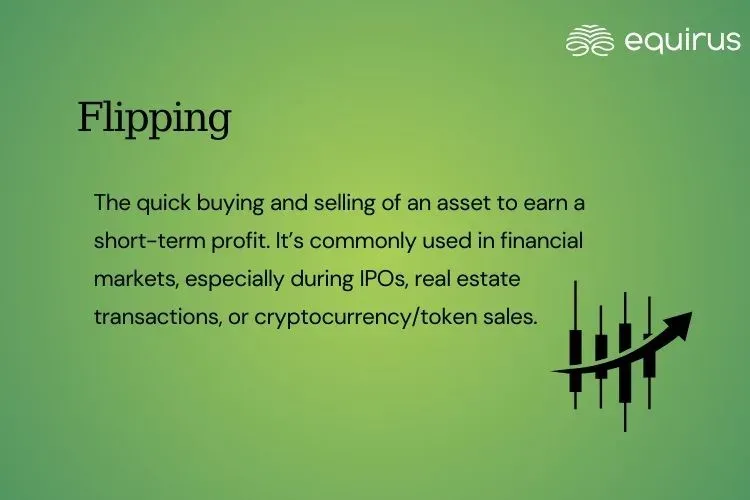Flipping

Key Highlights
-
Flipping refers to the quick buying and selling of an asset to earn a short-term profit.
-
The core idea of flipping is to capitalize on rapid price changes, often without holding the asset for the long term.
What is Flipping?
Flipping refers to the quick buying and selling of an asset to earn a short-term profit. It’s commonly used in financial markets, especially during Initial Public Offerings (IPOs), real estate transactions, or cryptocurrency/token sales.
The core idea of flipping is to capitalize on rapid price changes, often without holding the asset for the long term.
Where Flipping Is Common?
1. Stock Market (IPO Flipping)
Investors apply for shares in an IPO and sell them immediately when the stock lists at a higher price on the exchange.
- Goal: Profit from the listing day "pop" (price surge).
- Example: An investor gets IPO shares at ₹100 and sells them at ₹150 on listing day.
2. Real Estate
Buyers purchase underpriced or undervalued property, make improvements (optional), and sell quickly at a profit.
- Goal: Profit from rising property prices or value-addition.
3. Cryptocurrency and NFTs
Investors buy newly launched tokens or NFTs (often at presale or mint prices) and sell them quickly after they go live.
- Goal: Benefit from early hype and demand.
Why Do People Flip?
-
Quick Profits: No need to wait for long-term appreciation.
-
Market Timing: Traders take advantage of hype, sentiment, or short-term inefficiencies.
-
Low Holding Risk: The asset is sold quickly, reducing exposure to longer-term volatility.
Risks of Flipping
1. Volatility: Prices can drop just as fast as they rise.
2. Regulatory Restrictions: Some IPOs or markets may have lock-in periods or penalties for flipping.
3. Overvaluation: Flippers may overpay in a hot market and struggle to find buyers later.
4. Market Saturation: If many participants are flipping the same asset, it can flood the market and drive prices down.
Is Flipping Good or Bad?
It depends on the context:
-
For experienced traders, flipping can be profitable.
-
For companies or regulators, excessive flipping (like IPO flipping) can signal speculation and destabilize the stock price.
-
For long-term investors, it’s usually considered too risky or speculative.
Flipping vs. Investing
| Feature | Flipping | Investing |
|---|---|---|
| Time Horizon | Very short-term | Long-term |
| Objective | Quick profit from price swings | Long-term wealth creation |
| Risk Level | High | Moderate to low (varies) |
| Analysis Basis | Market sentiment, timing | Fundamentals, growth outlook |
